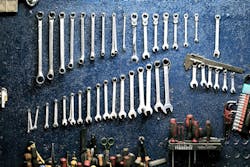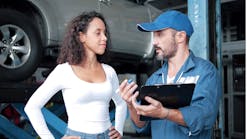Life as we know it was upended at the start of the coronavirus pandemic. Many of the adjustments made have one thing in common: the lack of hugs and handshakes, as well as more space between the people around us.
According to NOLN’s COVID-19 Business Impact Survey Follow-Up, 64 percent of shops have changed their processes, which includes implementing sanitation processes and creating distance and barriers between you and your customers. With the lack of physical contact, how have operators managed to maintain relationships with its customers with its newly installed procedures? Two shop owners discuss what processes have worked and ensure that they’re building a relationship with their old and new customer bases.
Keep it Drive-Thru
At Wingman Oil Change, both drive-thru service and customers waiting in the lobby were options, but customers were encouraged to stay in their vehicles during a service. But since the pandemic hit, owner John Page made it a requirement.
“Our goal is to have a drive-thru oil change experience,” Page says. “We want the guest to stay in the vehicle, even before the pandemic.
“We realized that by the guest staying in their vehicle, we became more efficient,” he adds.
On average, Page says they saved three minutes per vehicle, all because time getting in the vehicle to drive it into the bay was eliminated and staff now didn’t have to worry about spending time finding a guest. Not only has this ensured the shop practices social distancing, but has also made it more efficient and has even slightly increased car count numbers. This change not only worked well for the shop, but Page decided to keep it as a permanent shop practice, as well.
Staying Open
When the pandemic first hit and stay-at-home orders were put in place in Arizona, Kevin Leger, owner of seven different Meineke Car Care Centers in the Phoenix area, had to make some tough decisions.
Other franchises and competitors in the area were adjusting their business hours, even closing up completely to lower costs. Leger made the decision to stay open and keep hours the same. He was committed to keeping his staff paid through June. Initially, Leger used some cash reserves to make up for the revenue loss—35 percent lower car count and 25 percent lower sales—but receiving the Paycheck Protection Program loan in mid-April provided a buffer.
He used the money to provide an extra cushion to his customer service representatives’ commission amounts to make up for the difference in car count and sales, as well as adding extra cushion to his flat-rate technicians’ hours to their past six month’s average gross pay.
Through it all, he ended up with two positive results. First, it unintentionally created a higher degree of loyalty from his employees. Second, the shop gained new customers that previously went to other shops. When their shops closed, Legers’ locations remained ready to serve.
“If the shop is closed, we can’t help customers,” Leger says. “We took it as an opportunity to build better relationships that we may have taken advantage of in the past.”
Simplifying the Process
Another innovation, which was supposed to decrease touchpoints and the spread of COVID-19, was when Wingman Oil Change stopped washing customers’ windows inside and out. While the goal was to increase social distancing, Page realized that washing the windows wasn’t necessary. While it did force technicians to inspect the vehicle’s wiper blades, Page’s main goal was to create a safer environment and better efficiency.
Instead, Page gives customers that receive their quick lube service a free car wash at his car wash facility, Wingman Car Wash, right across the street. Page says eliminating this process aligned with his goal, and helped decrease bay time, too. This is another process Page intends to keep around his shop for the foreseeable future.
Following Up
The challenge for Leger’s operations was filling the customer service void. It made it hard for the staff to show a smile with masks covering them up. Instead of physical contact and these facial cues, Leger replaced it with more communication. The shop’s customer service rep is following up with its customers consistently, making follow-up calls two or three days after service to ask how it went. Even more, Leger is emphasizing the importance of thanking customers for their business and asking if they have any questions or concerns regarding their service or anything else on their mind. More often than not, staff now makes quite a bit of small talk with customers.
“We’re doing what we were doing before, but we are more diligent,” Leger says. “We’re now more focused on building relationships and a personal connection.”
While the shop always made follow-up calls, Leger intends to keep the diligence going post-pandemic.
Elevating Customer Service
Actions speak louder than words. For Page, the customer-business relationship starts from the moment that customer drives into the lot.
While it is now strictly a drive-thru facility, the shop still provides complimentary beverages to customers, and makes sure to deliver it in a specific way that minimizes contact. After a smile and friendly greeting, this is the first thing the technicians ask the customer as they pull into the bay.
“It’s giving them something before asking for anything from them,” Page says.
During the Texas summer months of the pandemic, it could get quite steamy inside of the service bay during a service, especially when a customer has their window rolled slightly down to talk with the technicians. So during the service, they make sure to pipe in air conditioning while they wait in their vehicle. It’s an initiative Page strives to maintain in his shop’s customer service atmosphere.
“There are a lot of things we are doing to say, ‘Hey, we want to take care of you,’” Page says, “It’s not about a handshake, that’s a physical act, it’s about everything you do to establish that relationship and trust.”





